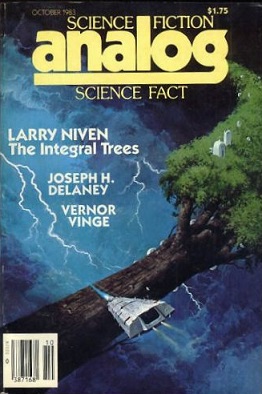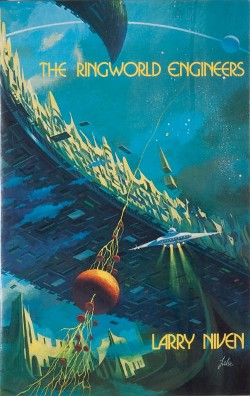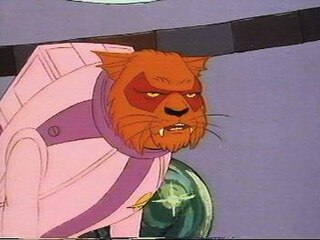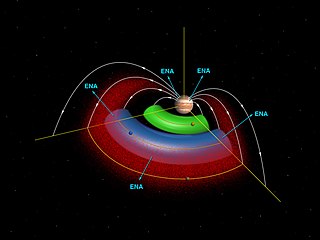Related Research Articles

Laurence van Cott Niven is an American science fiction writer. His 1970 novel Ringworld won the Hugo, Locus, Ditmar, and Nebula awards. With Jerry Pournelle he wrote The Mote in God's Eye (1974) and Lucifer's Hammer (1977). The Science Fiction and Fantasy Writers of America gave him the 2015 Damon Knight Memorial Grand Master Award.
Known Space is the fictional setting of about a dozen science fiction novels and several collections of short stories by American writer Larry Niven. It has also become a shared universe in the spin-off Man-Kzin Wars anthologies. The Internet Speculative Fiction Database (ISFDB) catalogs all works set in the fictional universe that includes Known Space under the series name Tales of Known Space, which was the title of a 1975 collection of Niven's short stories. The first-published work in the series, which was Niven's first published piece, was "The Coldest Place", in the December 1964 issue of If magazine, edited by Frederik Pohl. This was the first-published work in the 1975 collection.

Ringworld is a 1970 science fiction novel by Larry Niven, set in his Known Space universe and considered a classic of science fiction literature. Ringworld tells the story of Louis Wu and his companions on a mission to the Ringworld, a rotating wheel artificial world, an alien construct in space 186 million miles in diameter. Niven later added three sequel novels and then cowrote, with Edward M. Lerner, four prequels and a final sequel; the five latter novels constitute the Fleet of Worlds series. All the novels in the Ringworld series tie into numerous other books set in Known Space. Ringworld won the Nebula Award in 1970, as well as both the Hugo Award and Locus Award in 1971.

Timothy Thomas Powers is an American science fiction and fantasy author. His first major novel was The Drawing of the Dark (1979), but the novel that earned him wide praise was The Anubis Gates (1983), which won the Philip K. Dick Award, and has since been published in many other languages. His other written work include Dinner at Deviant's Palace (1985), Last Call (1992), Expiration Date (1996), Earthquake Weather (1997), Declare (2000), and Three Days to Never (2006). Powers has won the World Fantasy Award twice for his critically acclaimed novels Last Call and Declare. His 1987 novel On Stranger Tides served as inspiration for the Monkey Island franchise of video games and was optioned for the fourth Pirates of the Caribbean film.

Footfall is a 1985 science fiction novel by American writers Larry Niven and Jerry Pournelle. The book depicts the arrival of members of an alien species called the Fithp that have traveled to the Solar System from Alpha Centauri in a large spacecraft driven by a Bussard ramjet. Their intent is conquest of the planet Earth.

The Integral Trees is a 1984 science fiction novel by American writer Larry Niven. Like much of Niven's work, the story is heavily influenced by the setting: a gas torus, a ring of air around a neutron star. A sequel, The Smoke Ring, was published in 1987.

Pak Breeders and Pak Protectors are two developmental stages of fictional life in Larry Niven's Known Space universe. The Pak first appeared in "The Adults", which appeared in Galaxy in 1967; this story was expanded into the novel Protector by Larry Niven (1973). The Pak also appear in several of Niven's later novels, notably those set in the Ringworld.

The Smoke Ring is a 1987 science fiction novel by Larry Niven. Like much of Niven's work, the story is heavily influenced by the setting: a gas torus, a ring of air around a neutron star. It is a sequel to The Integral Trees.
"Neutron Star" is an English language science fiction short story by American writer Larry Niven. It was originally published in the October 1966 issue of Worlds of If. It was later reprinted in the collection of the same name and Crashlander. The story is set in Niven's fictional Known Space universe. It is notable for including a neutron star before their existence was widely known.

Protector is a 1973 science fiction novel by American writer Larry Niven, set in his Known Space universe. It was nominated for the Hugo in 1974, and placed fourth in the annual Locus poll for that year.

A World Out of Time is a science fiction novel by Larry Niven and published in 1976. It is set outside the Known Space universe of many of Niven's stories, but is otherwise fairly representative of his 1970s hard science fiction novels. The main part of the novel was originally serialized in Galaxy magazine as "Children of the State"; another part was originally published as the short story "Rammer". A World Out of Time placed fifth in the annual Locus Poll in 1977.

The Ringworld Engineers is a 1979 science fiction novel by American writer Larry Niven. It is the first sequel to Niven's Ringworld and was nominated for both the Hugo and Locus Awards in 1981.

The Ringworld Throne is a science fiction novel by American writer Larry Niven, first published in 1996. It is the direct sequel to his previous work The Ringworld Engineers (1980). He wrote it as a replacement after being unable to finish his contracted novel The Ghost Ships, the sequel to The Integral Trees and The Smoke Ring.

"The Slaver Weapon" is the fourteenth episode of the first season of the American animated science fiction television series Star Trek: The Animated Series. It first aired on NBC on December 15, 1973, and was written by Larry Niven. It was based on his original short story "The Soft Weapon". This episode was expanded to become the first half of a full-length novel by science-fiction author Alan Dean Foster as Star Trek Log Ten.

A gas torus is a toroidal cloud of gas or plasma that encircles a planet. In the Solar System, gas tori tend to be produced by the interaction of a satellite's atmosphere with the magnetic field of a planet. The most famous example of this is the Io plasma torus, which is produced by the ionization of roughly 1 ton per second of oxygen and sulfur from the tenuous atmosphere of Jupiter's volcanic moon Io. Before being ionized, these particles are part of a neutral torus, also centered on the orbit of Io. Energetic particle observations also suggest the presence of a neutral torus around the orbit of Jupiter's moon Europa although such a torus would be merged with the outer portions of an Io torus.

N-Space is a collection of short stories by American science fiction author Larry Niven released in 1990. Some of the stories are set in Niven's Known Space universe. Also included are various essays, articles and anecdotes by Niven and others, excerpts from some of his novels, and an introduction by Tom Clancy. Its sequel is Playgrounds of the Mind.

"The Borderland of Sol" is a science fiction novelette by American writer Larry Niven. It is the fifth in the Known Space series of stories about crashlander Beowulf Shaeffer.

Tales of Known Space: The Universe of Larry Niven is a science fiction collection by American writer Larry Niven, collecting thirteen short stories published between 1964 and 1975 along with several essays by Niven and a chronology. This book was collected in Three Books of Known Space.
This is a complete bibliography by American science fiction author Larry Niven:
References
- 1 2 Larry Niven (16 March 2003). "Larry's Letters". Archived from the original on 22 February 2009.
- 1 2 Larry Niven (29 May 2000). "Iuniverse Chat". Archived from the original on 21 May 2008.
- 1 2 Playgrounds of the Mind, pp. 693-94, Larry Niven
- ↑ Worlds Without End, A World Out of Time
- ↑ Worlds Without End, The Integral Trees
- ↑ Worlds Without End, The Smoke Ring
- ↑ "1977 Award Winners & Nominees". Worlds Without End. Retrieved 2009-07-20.
- ↑ "1985 Award Winners & Nominees". Worlds Without End. Retrieved 2009-07-20.